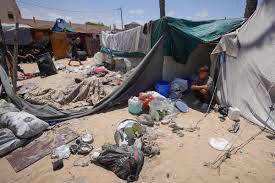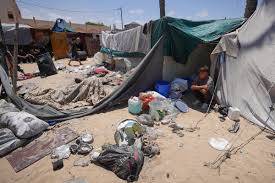The United Nations warned that life has become "horrific" in some areas of southern Gaza since the start of the Israeli attack on Rafah in early May, noting that the situation in the north is improving. Matthew Hollingworth, the director of the World Food Program in the Palestinian territories, stated, "The displacement we have seen over the past twenty days from Rafah is a terrifying and horrific experience for a very large number of people."
In the south, the agency's bakeries have shut their doors due to a lack of fuel. Since May 7, when the Israeli army launched its assault on Rafah until the 20th of the month, "not a single World Food Program truck has crossed the crossings to reach Rafah from Egypt," according to Hollingworth. The World Food Program has also lost access to its main warehouse in the southern region because it is located in an evacuated area.
He explained, "We have lost this warehouse completely, including a stock of 2,700 tons of food items that were either looted or damaged due to fighting." One million people fleeing the bombardment and fighting in Rafah have relocated to the coastal Ma'ozah area between Rafah and Khan Yunis, which Israel classified as a "humanitarian area" to accommodate the displaced.
According to Hollingworth, they lack water, food, fuel, health services, and the space needed to dig latrines. The UN official emphasized that "the sounds and smells of everyday life are horrific and terrifying." The World Food Program is currently feeding 27,000 people, "but this is not enough."
In central Gaza, the agency provides about 400,000 hot meals daily and operates six bakeries. On the other hand, the situation in the northern part of the Palestinian territory is improving, as UN agencies warned in March that famine was imminent.
Thanks to the opening of crossings, about 12,000 tons of aid, mostly food items, have been delivered since May 1. Hollingworth said, "There has been a change in terms of food availability," despite ongoing significant issues related to health aid, drinking water, and sewage treatment.
Due to desperation, some people leave their identification documents as collateral to enable them to purchase goods, despite these documents being essential for registering and obtaining assistance. He noted that since trucks began entering Gaza from Egypt through the Israeli-controlled Kerem Shalom crossing, little aid has reached.
He stressed the need to create "a river of aid if we want to ensure that we do not see the most severe forms of hunger becoming more common," calling for "the complete opening of southern corridors." He added, "What we fundamentally need is an immediate ceasefire." He concluded, "We know this may not happen immediately, so in the meantime, there should be better coordination between aid and commercial shipments being delivered."




